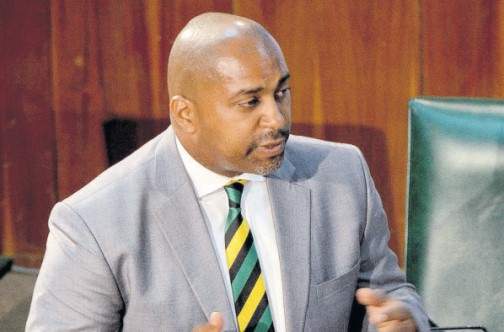MONTEGO BAY, St James — Opposition spokesperson on science and technology Julian Robinson says while adopting 5G mobile networks is imminent, it comes with a number of risks.
He is therefore urging Jamaica to look into the risks associated with the new technology as it mulls its adoption.
The fifth generation cellular network technology, 5G, uses higher frequency waves than present mobile networks, which allow for more devices to have access to the Internet at the same time and at faster speeds. 5G network, which has a peak download speed at 20 gigabits per second or 20,480 megabits per second, is capable of providing speeds of up to 100 times that of 4G LTE (long term evolution).
In fact, several countries around the world are now racing to have 5G networks implemented.
In his greetings at the Spectrum Management Authority G5 Symposium, held at S Hotel in St James last week Friday, Robinson noted that, while the technology provides great potential, it comes with cybersecurity risks.
“5G…allows us to do everything — from running our toasters, our TV, our air conditioners, and all of these things. But, obviously, by doing that, you are exposing yourself to greater risk from the persons who are hacking, and, apart from disruptions to business, the main motivation for those hackers are financial rewards,” stated Robinson.
“So there is obviously an imperative on private sector institutions, but on the Government, to continue to invest in our capabilities so that we can deal with those threats. And, being a small developing country doesn’t make us any less susceptible to these threats. In fact, these criminals look for what I would call easy points to get into the network,” Robinson continued.
The radio frequency waves used by 5G networks travel shorter distances through urban spaces, hence the need for service providers to implement more transmitter masts in comparison to current technology, such as 2G, 3G and 4G LTE, positioned closer to ground level.
With possible concerns about health risks, Robinson said public education is important.
“Having more towers spread throughout the country, one is aesthetic, but more importantly, if there are health factors, how do you address that? And, certainly, the public education around ensuring that people feel comfortable being in an area where a tower might be close to you, a school or somewhere else,” he suggested.
In the meantime, the Opposition spokesperson on science and technology said the allocation of frequencies to service providers is something that must be carefully considered, to ensure the maximisation of private good and the protection of public interest.
Pointing to the present “unacceptable” call service quality being experienced by customers from the two telecommunications service providers, Robinson said there is a need for regulators, such as the Office of Utilities Regulation (OUR) and other entities, to ensure that as the country moves towards 5G networks that the quality of the service is at a standard that is not disruptive.
In the meantime, Minister of Science, Energy and Technology Fayval Williams, in her greetings, pointed to Cisco’s global mobile data traffic forecast for the period 2017-2022, which outlines that mobile devices and connections will grow to 12.3 billion. She said a 5G connection would generate 2.6 times more traffic than the average 4G connection, hence the demand for frequency spectrum.
“There will be 8.4 billion handheld or personal mobile-ready devices and 3.9 billion machine-to-machine connections, whether they be GPS (Global Positioning System) in cars, asset tracking systems in shipping and manufacturing sectors, or medical applications which will make patient records and health status more readily available.
“The growth in data-hungry technologies will increase the demand for spectrum, which makes for efficient planning for the use of this finite spectrum more critical,” added Williams.
As a result, the minister has recommended that the Spectrum Management Authority continue to position itself to facilitate a technology-enabled society.




Leave A Comment